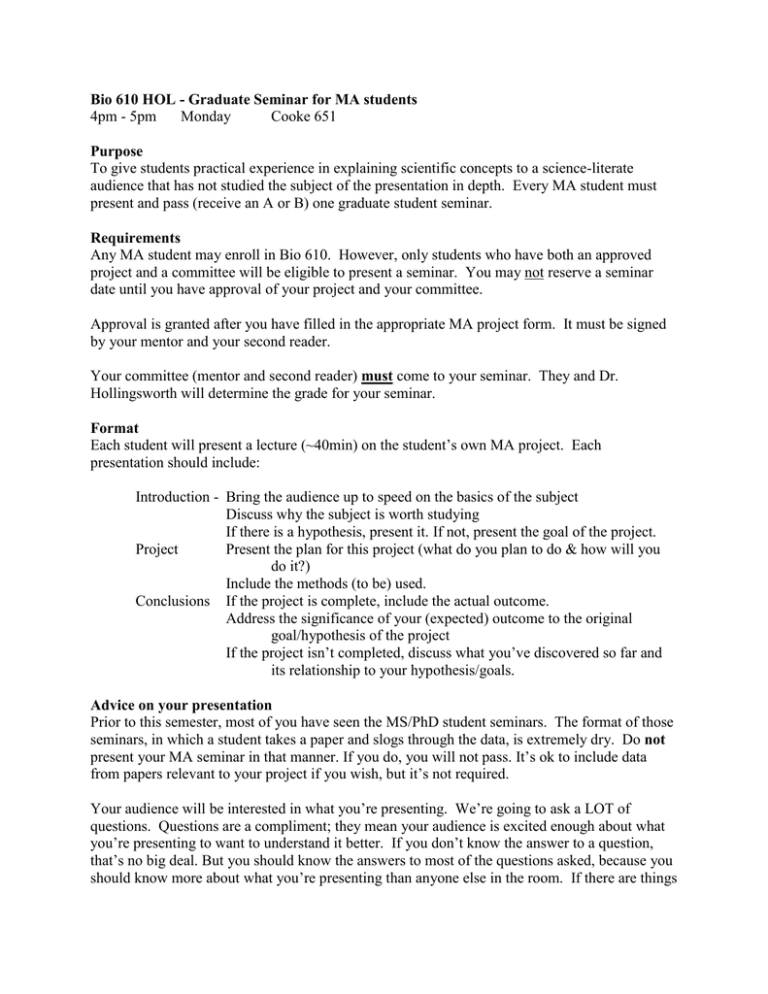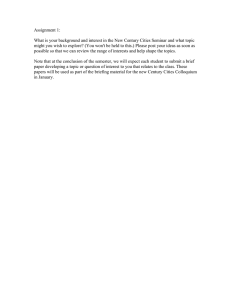Graduate Seminar for M.A. Students
advertisement

Bio 610 HOL - Graduate Seminar for MA students 4pm - 5pm Monday Cooke 651 Purpose To give students practical experience in explaining scientific concepts to a science-literate audience that has not studied the subject of the presentation in depth. Every MA student must present and pass (receive an A or B) one graduate student seminar. Requirements Any MA student may enroll in Bio 610. However, only students who have both an approved project and a committee will be eligible to present a seminar. You may not reserve a seminar date until you have approval of your project and your committee. Approval is granted after you have filled in the appropriate MA project form. It must be signed by your mentor and your second reader. Your committee (mentor and second reader) must come to your seminar. They and Dr. Hollingsworth will determine the grade for your seminar. Format Each student will present a lecture (~40min) on the student’s own MA project. Each presentation should include: Introduction - Bring the audience up to speed on the basics of the subject Discuss why the subject is worth studying If there is a hypothesis, present it. If not, present the goal of the project. Project Present the plan for this project (what do you plan to do & how will you do it?) Include the methods (to be) used. Conclusions If the project is complete, include the actual outcome. Address the significance of your (expected) outcome to the original goal/hypothesis of the project If the project isn’t completed, discuss what you’ve discovered so far and its relationship to your hypothesis/goals. Advice on your presentation Prior to this semester, most of you have seen the MS/PhD student seminars. The format of those seminars, in which a student takes a paper and slogs through the data, is extremely dry. Do not present your MA seminar in that manner. If you do, you will not pass. It’s ok to include data from papers relevant to your project if you wish, but it’s not required. Your audience will be interested in what you’re presenting. We’re going to ask a LOT of questions. Questions are a compliment; they mean your audience is excited enough about what you’re presenting to want to understand it better. If you don’t know the answer to a question, that’s no big deal. But you should know the answers to most of the questions asked, because you should know more about what you’re presenting than anyone else in the room. If there are things in your presentation that you truly don’t understand, then either figure them out or leave them out of your talk. You must be able to answer the majority of the questions that you’re asked to receive a passing grade. It’s better to present less information and have your audience understand it than rush through things and leave us confused. Grading Each presentation will be graded by a member of the student’s committee and Dr. Hollingsworth. Grading will have two components: 50% How clear was the presentation? Did it follow a logical order, were any visuals easy to read, etc. 50% How well did the student appear to understand the subject? This will be assessed by the clarity of the presentation and the student’s ability to understand and answer questions. If a presentation is not acceptable for a passing grade, the student will be allowed to make another presentation at a later date. If time permits, that date will be within the same semester. Attendance All students, including those who are not giving seminars this semester, are required to attend every day on which a seminar is presented. Failure to attend will result in a lower grade. Missing two days will result in a failing grade for the course.
